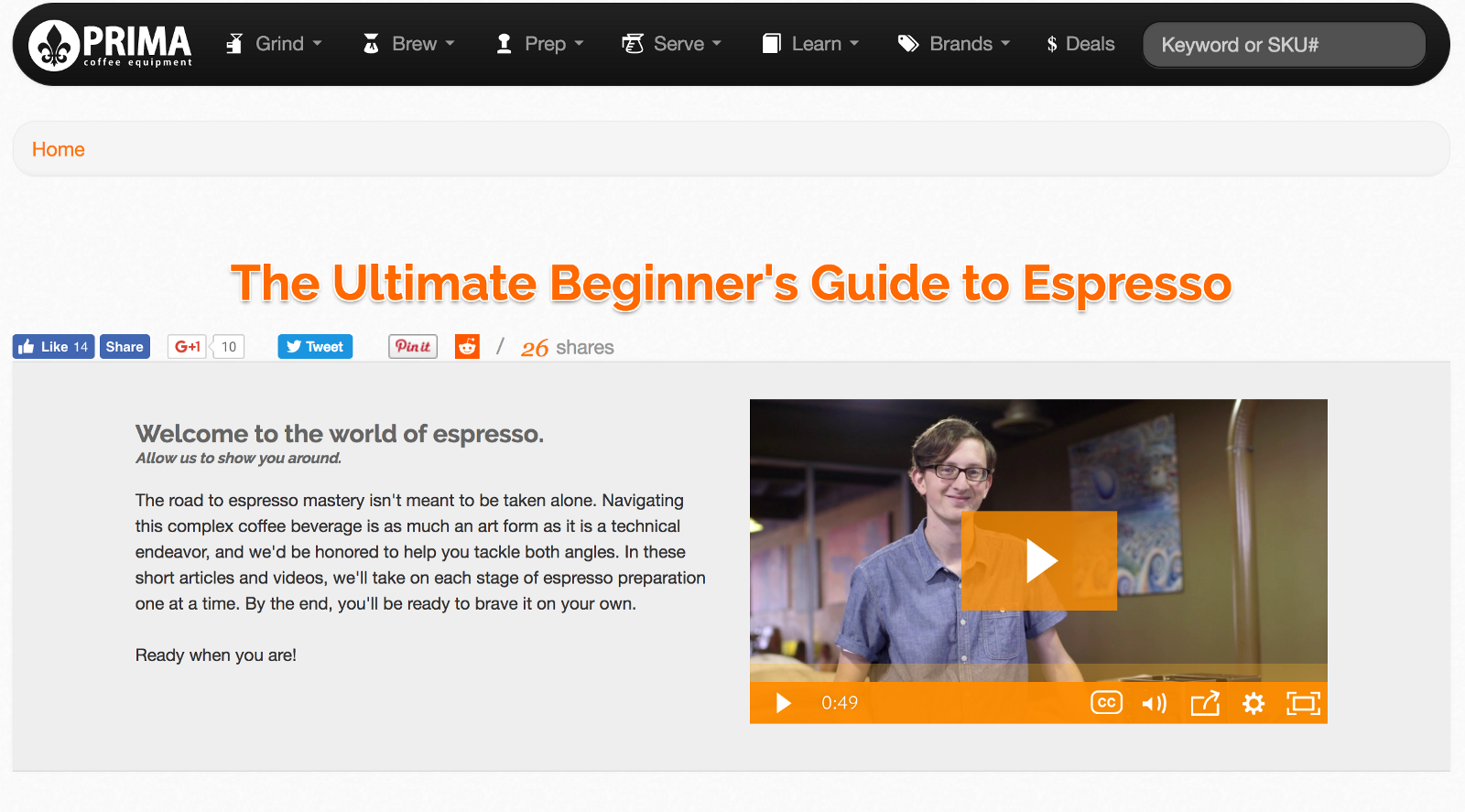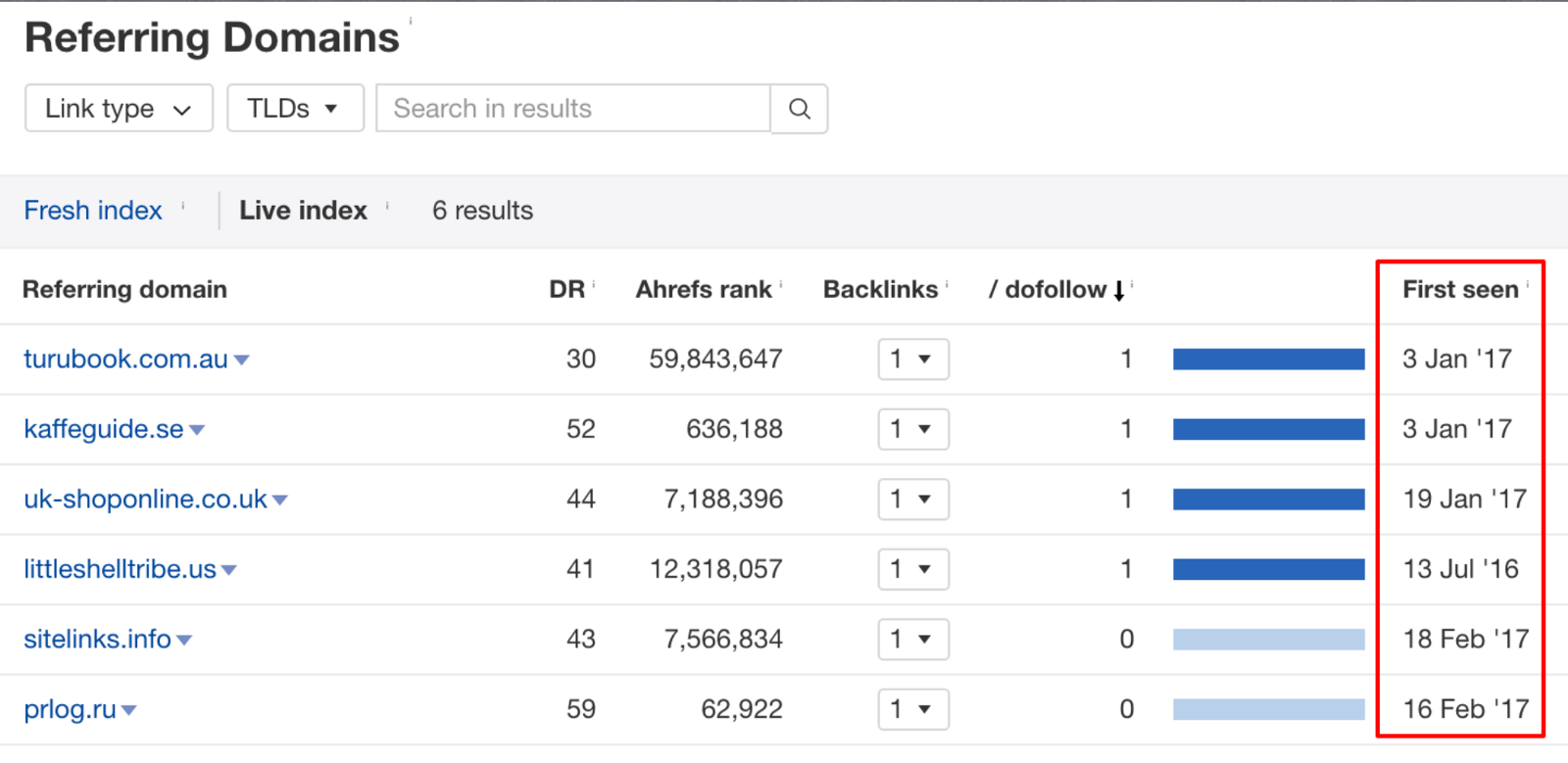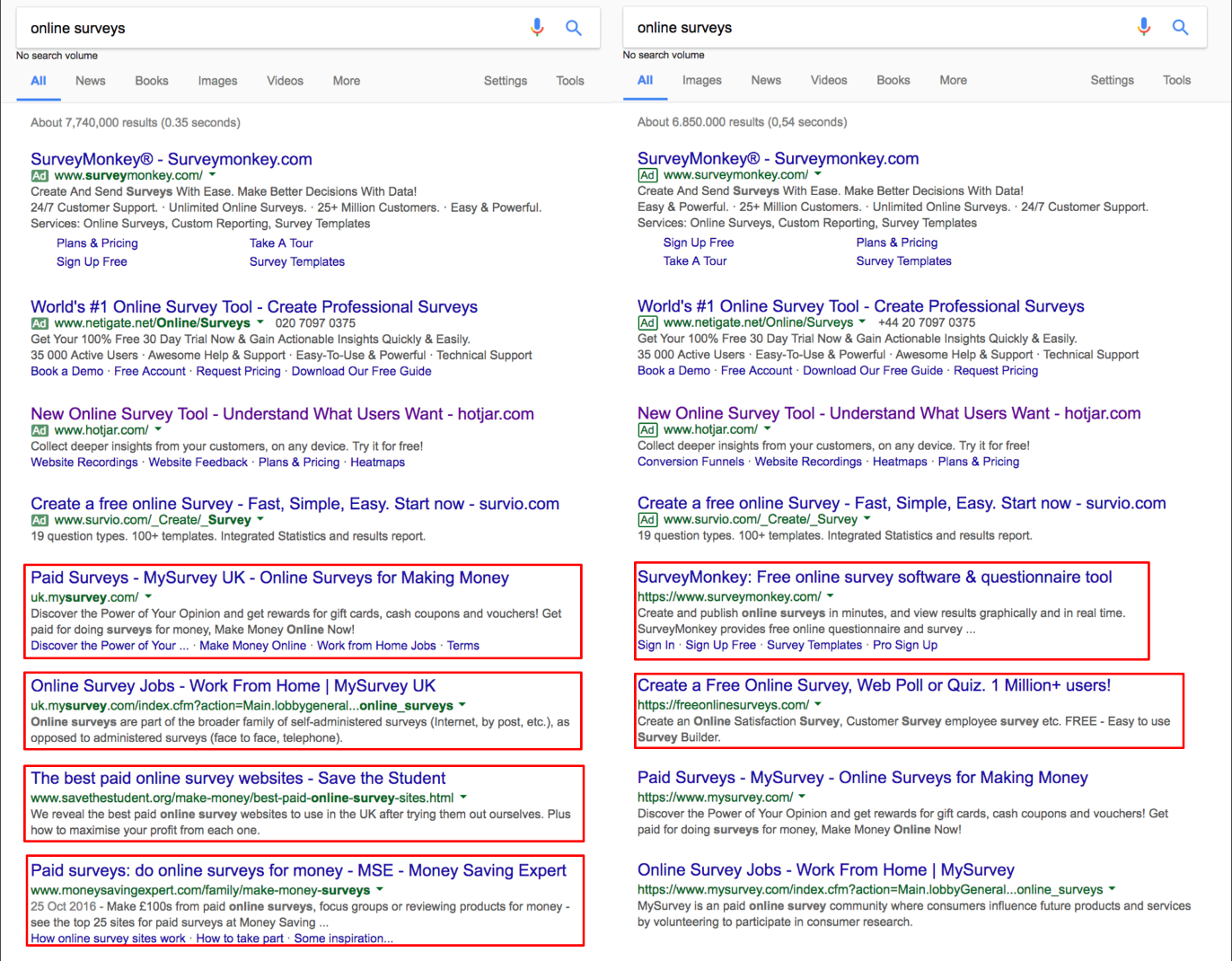Quello che dovete sapere su Google per una ricerca ottimale delle parole chiave per la SEO

I’m not being a drama queen when I say that SEO doesn’t exist without keywords.
Keyword research is the very foundation of SEO. There is no way you can optimise your website and your content if you don’t know what keywords you are targeting. They’re the compass to your strategy.
Now, you don’t have to be an SEO expert to come up with a huge list of keywords you want to target. Knowing what it takes to rank high for each one of them is a different story. As most marketeers out there are using the same tools to find their keywords (yes, I’m looking at you, Google Keyword Planner), many websites end up fighting over the same keywords.
So what about those expensive keyword research tools from the likes of Moz.com, Ahrefs and SEMRush? Don’t they tell you about how hard it is to rank #1 for a given keyword — keyword difficulty? Not quite. While these tools can give you an idea, they’re never 100% accurate. In spite of what they’ll have you believe.
Why? I’ll let you in on a little secret.
Perché nessuno sa come Google classifica le pagine.
What we do know is that it uses over 200 different factors, of which the three most important are links, content and RankBrain (its fresh AI-algorithm). Not necessarily in that order. What we also know is that Google is continuously experimenting with machine learning and new AI-algorithms. Google’s search engine is thus in a constant stage of mutation, with very few to no certainties for us to build our SEO strategies on.
Siamo condannati all'eternità? Non proprio, possiamo ancora avvicinarci a ciò che Google sta facendo e utilizzare queste informazioni quando impostiamo le strategie SEO. Dovrebbe comunque contare qualcosa, no?
Cosa cerca Google? 🔎
Start with links 🔗
For starters, you’re gonna want to find out the top ranking pages for your keyword. And, more importantly, the number of backlinks these pages have.
Let’s go for dire wolf in this example (yes, I dig Game Of Thrones). I’ll be using Ahrefs’ Keyword Explorer throughout this post, but you can do more or less the same stuff with similar tools from Moz.com and SEMRush. None of these are free, but they all offer a free trial to get you started.
We’re interested in the SERP results. For those who don’t know: SERP is just a shorter (and cooler) way to say Search Engine Results Page. All the way down in Ahrefs’ Keyword Explorer.

The first thing you’ll notice is the importance of Domains. The more domains link to a page, the higher Google will rank it in its search results. This is rule number 1.
It’s not all quantity over quality though. In fact, 10 links from a website with high authority will rank the page higher than 100 links from a website with low authority. That’s why the number of domain links doesn’t linearly descend from positions 1 tot 10. The authority of the domain is indicated by UR or URL Rating.
As you can see, UR actually has more impact on page ranking than the number of linking domains. That makes sense as UR itself is determined by the quality of the domains linking to it. It’s a more complex and aggregated metric than number of domains.
So, to rank highly you need a lot of links and not just any link: links from high quality websites. Chances are you’re going No sh*t Sherlock on me by now, but bear with me. The amount of links are important for a page’s ranking, making it hard for startups to compete with bigger companies on SEO, but it’s not the whole story.
Content is king 📝
You can outrank pages with more backlinks if your content is more relevant to the keyword you’re targeting. Let’s have a look at the keyword espresso.

Wikipedia’s piece on espresso being on top is no surprise. What happens then, is more interesting. How do two pages with rather low amounts of backlinks outrank a page with 2336 domains linking to it? Let’s have a closer look.

MacRabbit Espresso turns out to be productivity software, not coffee. Based on the content associated with the keyword espresso, Google knows you’re more likely looking for coffee than you are for software. In fact, the two pages outranking this page are very on-topic when it comes to espresso and coffee.

Still, it’s curious how a page with just six linking domains outranks other pages who are clearly also dedicated to espresso. Let’s have a look at its backlink profile.

All six backlinks have surfaced rather recently. Which brings us to yet another factor Google takes into account when ranking pages: the pace at which a page collects backlinks. Are we done yet? Not exactly. In fact, we barely scratched the surface of how Google goes about ranking pages. Here’s a few more things Google pays attention to:
- Posizione del link nella pagina. È probabile che il link venga notato o che invii traffico?
- Testo di ancoraggio del link
- Testo circostante il link
- Quantità di altri backlink sulla pagina
- Quanti altri backlink ci sono nella pagina?
- Il ritmo con cui la pagina viene acquisire backlink
- … who knows what else
Back to espresso and content relevance. What we learnt is that you can outrank pages with a lot of links if your content is more relevant to the search query. However, a lack of relevant content like we’ve seen before is rather rare in Google. Usually, the top ranking pages for a search query will have very relevant content. At best, there will be pages on top with slightly imperfect content. This will give you far less of a competitive edge when targeting keywords.
La domanda ora è: come si fa a sapere se le pagine che occupano le prime posizioni per la propria parola chiave sono prive di contenuti rilevanti? E come si fa a rendere la propria pagina il più rilevante possibile per la parola chiave agli occhi di Google?
Topical relevance beats headlines ☝️
There’s still a common misconception that when you use a keyword in your page title you’ll be likely to outrank pages that don’t use the keyword in their title. That may have been true in 2010, but it’s 2017 now. Today, Google is smart enough to know about the relevance of certain keywords. This means you won’t be able to outrank a page that uses guest blogging in their title for the keyword guest writing by simply putting that in your title (given that other page has more backlinks, a higher UR or both). Google knows the two keywords are family, as is guest posting (result #3).

There’s no use in trying to fool Google by being clever about the titles and subtitles. It knows what your page is about. In fact, from a study of 2 million keyword searches Ahrefs found that about 75% of the top 10 ranking pages on Google don’t have a single mention of the keyword in their title.
How to achieve maximum topical relevance 🏆
If you’re looking for quick wins here, I’ll have to disappoint you. Outranking current top 10 pages purely on content is no walk in the park. But hey, you don’t get owt for nowt, right?
First and foremost, you’ll need to learn how Google works, how it interprets search queries and matches them to topics it crawls from the Internet. If that sounds complicated to you, that’s because it is.
To outsmart everyone, you’ll have to start studying the wondrous ways of how Google works. Despite its extraordinary complexity, Google is still a machine and if you understand how it works, you’ll have an edge over your competitors. Two things you would have to get into are latent semantic indexing (LSI) and latent Dirichlet allocation (LDA). In short, they’re about how Google takes into account keywords that are related to the main keyword, in context. This kind of semantic SEO can generate over 25% more clicks than standard SEO.
Personally, I settle to just know about this. I’d rather write content for actual humans than to please a machine. Approach things like LSI and LDA as guidelines, not dogmas. I think you should avoid losing touch with what your target audience wants to read by wanting to craft a Google-perfect piece of words. Your readers are human so you should be too if you want to connect with them. Find a balance between what they want to read and what Google is looking for.
Feed yourself inspiration by reading the top ranking pages for a given keyword and list up what other keywords they rank highly for. These keywords are likely to be associated with your target keyword by Google. Then, use your brain, the most powerful tool of them all. If you read the pages related to a certain keyword, you’ll build up an internal thesaurus of topics and other keywords inside of your own head. This will allow you to produce logical, coherent and relevant quality content on your topic.
Know your audience 👯
Non tutte le ricerche sono state create uguali. Ad esempio, le persone che cercano sondaggi online nel Regno Unito potrebbero non essere alla ricerca della stessa cosa delle persone negli Stati Uniti.

Come è emerso, le persone nel Regno Unito sembrano più interessate ai sondaggi online come modo per guadagnare un po' di soldi. Le persone negli Stati Uniti, invece, tendono a cercare maggiormente strumenti per creare sondaggi online. Questo si chiama intenzione dell'utente ed è un altro caso di Google sa.
How does it know? Again, we’re not sure. But it probably has something to do with things like:
- quanto tempo le persone rimangono su una pagina dopo aver cliccato su di essa dalla SERP
- se le persone si accontentano dei risultati della loro prima query di ricerca o continuano a raffinare fino a quando non ottengono ciò che cercano
- se le persone cliccano su un maggior numero di risultati di ricerca e navigano in altre SERP invece di attenersi solo ai risultati principali
User intent is said to trump topical relevance. So even if you have to most on-topic page of all times when it comes to creating an online survey, it’ll likely rank under a page offering money for filling out surveys. Meaning you’re gonna want to know what people’s search intents are when they’re searching a keyword in your geographical target market.
Leave your mark on history 👨🎨
A great way to figure out if a keyword is difficult to rank for is to check if Google is happy with the relevance of search results. You can do this by looking up the SERP results for your keyword, in Ahrefs Keyword Explorer or similar tools. If results have been the same for quite some time, it’ll be hard to outrank them. If results have been changing a lot, it’s likely Google is still looking to get the best content for its users.
Let’s have a look at the SERP history for content marketing. The graphs below show the history for the top 10 positions for

E confronta con Marketing su Facebook.

Now, my current Ahrefs plan only allows me to go back six months so takeaways are limited here. But you get the picture. Content marketing has seen one page jumping up in last six months with the other ones being comfortably on top for quite some time. The story’s different for Facebook marketing, with several pages battling fiercely for the top positions.
Have tools help you out 🛠️
So, to find out the difficulty to rank for a given keyword you can take into account all of the things mentioned above. You can also just pay to use a tool like Ahrefs (or Moz.com or SEMrush) and have their Keyword Explorer find out the difficulty for you. While this is the easy option, it’s probably not enough to rank among the first 10. Ahrefs says t calculates these metrics from the assumption that Google heavily relies on backlinks to determine which pages should rank in the top 10. Now, as we have just seen, there’s more to play with. Google’s top 10 is another league, one where you’ll need to know about all of the weird little things Google cares about in order to win it over.
That being said, a tool like Ahrefs can save you a lot of time and energy when putting your initial list of keywords together. Let’s have a look at dire wolf again.

Ahrefs says it considers 0–10 easy, 11–30 medium, 31–70 hard and 70–100 super hard.
You can combine KD difficulty with data about keywords your page currently ranks pretty good for. This should give you a pretty good initial idea of the keyword’s potential.
What do you do now? 🤔
While this is all very nice and stuff, it doesn’t really tell how you should get started on keyword research in the first place.
The very first thing you should do is brainstorm with your team and come up with a list with keywords that are related, associated to what your core message is. Think of sort of thesaurus of just words that help tell the story of what you want to stand for. Don’t look at Google at all at this particular stage.
Then, screen all of these keywords using the tips in this post and some solid SEO tools. Pick the ones that are most easily to rank highly for, yet are very relevant to your brand’s identity at the same time. Don’t make the mistake of redirecting all of your strategy and content to fully optimise for Google. People know quality and unique content when they see it and will be coming back for it.
Nei prossimi mesi arriveranno su questo blog altri post sulla SEO e sulla ricerca delle parole chiave in particolare. La maggior parte di essi sarà più pratica (meno teorica) di questo. Questo per essere sicuri di conoscere Google prima di provare a sedurlo.
We hope you liked this post. If you did, hit ❤ and spread the word! You can follow us @salesflare su Twitter per ulteriori informazioni su crm, vendite, growth hacking e startup.
- I 20 migliori libri di vendita che Elon Musk sta probabilmente leggendo - 14 Febbraio 2023
- 6 modi infallibili per far ottenere alla vostra startup i primi 100 clienti - 6 dicembre 2022
- Come costruire un imbuto di vendita che venda - 2 Settembre 2021
